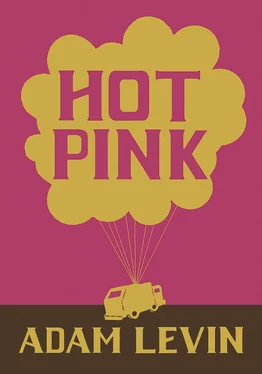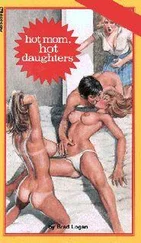We didn’t start with the bad guy. We didn’t start with any guy. All we had to write on were paper napkins, and the only pen Tom had was a floaty pen: there was a flat ski-slope in the water cylinder and when you turned the pen to write with it, a flat man in a flat ski cap descended the slope in slow motion. The pen was intended to be a souvenir of some place mountainous and fondly remembered. It was never meant to function as a writing utensil. Its cheap ballpoint would roll only under a heavy hand. I tore through the napkin, scratched a line into the countertop. The cook skipped the gratis cheese squares that morning.
That evening, we all went bowling together. We bowled four games, then Tom noticed how late it was. All of us had to be up for work early. Of the three of us, I lived closest to the lanes. Tom, who was driving, mentioned that to us — I’m sure you remember — and he said it made sense to drop me off first. I wasn’t sure it made sense, but by then we were only a block from my apartment.
Today, at my mailbox, square envelope in hand, staring down at my many-seriffed, hand-addressed name, I needed a cigarette like never before, and was digging in my pocket with my free hand, blindly, in search of my lighter, when I underwent a sudden, whole-body spasm (I’m fine), and the hand in my pocket closed on everything in there — keys, receipts, change, etc. — then upwardly jerked and dumped it all on the floor. I didn’t find the souvenir pen among the spillage — why would I? it’s been years — but I thought I should have. I thought it would have been nice to kind of round things out.
I guess I’m probably too old to invent a religion now, too. But thanks for the invitation. I’m regretful, can’t make it, best of luck to the both of you.
A crack in the wall behind their bed oozed gel. Neither knew what to do, what it meant, who to call. The man called their painter. “A crack?” said the painter. “A crack oozing gel,” the man said to the painter. “I’ll be there,” said the painter, “at once.” He was. He arrived by himself, with a brush, after breakfast. This was on a Sunday, and the man, who’d liked the painter, liked him even better now for coming straight over.
The woman let the painter in — the man was in the bathroom — and showed him upstairs to the crack behind the bed. “Where’s the gel?” asked the painter. “I wiped it,” said the woman, “and threw it away.” Hearing this exchange through the bathroom door, the man blushed for no reason he was able to discern. “Well, this will be simple,” the painter told the woman. “Is the paint where I left it?” he asked her. It was.
The painter went down to the closet in the basement, took the can of paint he’d left, and brought it upstairs. He painted the crack till the crack disappeared. He slid the bed back to where it had been, and returned the can of paint to the closet.
The man had fixed coffee. He poured two cups and walked the painter out front. “So you’re not in your whites,” he said to the painter, who wore a pair of slacks and a button-down shirt. “I was on my way to church when you called,” said the painter. “Church,” the man said, “that’s something, that’s something… We really appreciate all that you’ve done.” “Not at all,” said the painter, “it’s only decent. A brand new house? A nice young couple? A pit bull who acts like a Labrador retriever? A crack in the wall behind the bed oozing gel doesn’t fit in that picture — could drive a man crazy. This coffee, by the way, is completely delicious.” “Rwandan,” the man said. “Rwandan,” said the painter.
They briefly discussed the painter’s new car, which was silver and German, a car the man was happy to see that a painter — any painter at all, and especially their painter — owned. Prior to this, he’d only seen their painter’s van. A high-performance model, this silver German car was. The man had been poised to purchase one himself, just prior to learning that the woman was pregnant, at which point he’d settled on a rounder green car, a larger and Swedish, responsible car. He wanted, the man did, to share with the painter, toward whom he was feeling fraternal warmth, the story of how he’d nearly bought the German car, but because his wife wasn’t far enough along yet (she’d miscarried once, and they both feared jinxing) and the story would not be much of a story if he left out the reason why he bought the Swedish car instead, the man decided not to mention it at all. He could tell it some other time. Maybe at the baptism. Yes, at the baptism. The man would invite the painter to the baptism. He ran it by his wife at dinner that night. She agreed that the painter was a likable person, but said it wasn’t safe yet to talk about the baptism. They talked about the dog. How handsome it was. The way its muscles rippled its shiny, fawn coat.
The crack returned. The crack oozed gel. That the problem wasn’t paint was easy to deduce. The man called their builder. The connection was bad, fuzzing their voices, cutting in and out. “Call me back,” said the man. “Sometimes that’ll fix it.” “_____ ____gel?” said the builder. “Oozing from the wall behind the bed,” said the man. “Gel where?” said the builder, and, “Merf merf merf.” “Call me back,” said the man. “It’s the walls are cracking, or ______merf?” said the builder. “One wall,” said the man, “and the paint as well, but it’s not the paint. We painted it over. It must be the wall.” “I’ll send someone merf,” the builder told the man. “When?” said the man. “Merf,” said the builder. Here the call ended. The man redialed. He went straight to voicemail, waited for the prompt, identified himself, asked the pertinent question, and ended the call. What if the problem was on his end, though? Or what if the problem was a satellite problem? His message would sound like merf merf merf . He went to the patio and called once more, left the same message.
Then he drank water from the garden hose, nervously. Why should he be nervous? He shouldn’t be nervous. He tightened the spigot and tried to think of something to calm himself down. He thought of some breasts, all the breasts he could picture, their various cleavages, hang-styles, and nipples. His wife had great nipples, pink and uninvertable, a little bit upturned, the best he’d ever seen. He wondered if the mouth of their baby would ruin them, hoped it wouldn’t, then feared that he’d never get to find out, that the baby wouldn’t make it into the world, would die in the womb, a forbidden thought. A forbidden thought that did not calm him down.
Where was the dog? He slid the door open and called for the dog. The dog came running. He threw toward the fence a short length of rope that was tied in a bone-shape and scented with beef spray. The dog brought it back, laid it at the man’s feet, looked up in his eyes, expectant. This dog was a pit bull, a breed that sometime in the mid-1980s, back when the man was still in grade school, had acquired a reputation for killing babies.
“You wouldn’t, would you?” the man asked the dog.
It rose on its hind legs and leaned on the man, pressing its paws to his nipples. They danced.
The builder arrived at noon with a worker. “Let’s have us a look at this hole,” said the builder. “It’s really just a crack,” the man told the builder. “A crack, a hole, leaks paste, what have you — needs to be looked at by us,” said the builder. At the words leaks paste , the worker made a face that seemed, at first, to signify disgust, but the worker was foreign, the man soon determined (the mustache, the hairline, the fit of the pants), an Eastern or Central European of some kind, and what looked like disgust might not have been disgust but firm resolve: steadfast, unbending, workerly resolve to ascertain the source of the problem at hand, and execute, unflinchingly, by any means necessary, the procedures required to solve that problem. Toward the foreign worker the man felt warmth, fraternal warmth. In his country of origin, he’d likely been a scientist, advanced degree in physics, or a structural engineer, and when he’d fled to America, where he didn’t know the language and couldn’t find a job in his specialized field, he’d had to suck it up and take what he could get, and here he was now, doing just that, the best that he could, making lemonade, no excuses, no whining, no annoying self-pity. That the worker looked like someone who liked his liquor and slapped his wife around (not to say simultaneously, the beatings and the drunkenness) — that was cowardly, nationalistic, Other-fearing stuff on the part of the man. The man rejected it outright, admired the worker. This worker was a person who could work with his hands and his brain the both — a noble person. The man wondered what he drove and hoped it was German. He doubted it was German, but still, it seemed possible, considering the car the painter drove, and the fact that both men were employed by the builder. The man felt grateful. Good men were on the job. He led them upstairs.
Читать дальше











